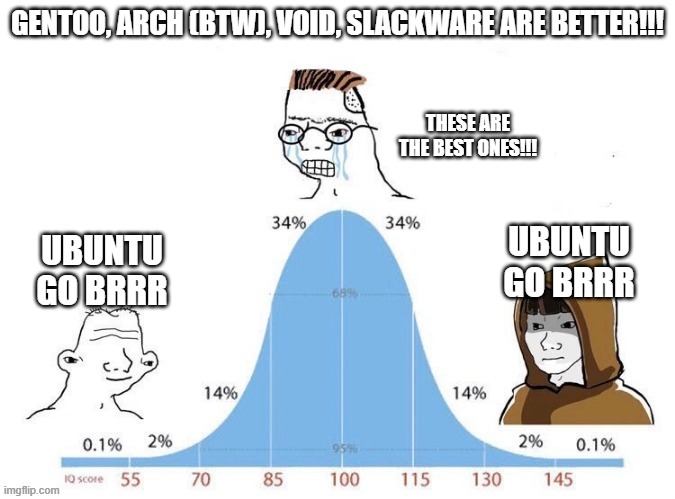this post was submitted on 18 Jul 2023
310 points (83.7% liked)
linuxmemes
21263 readers
960 users here now
Hint: :q!
Sister communities:
- LemmyMemes: Memes
- LemmyShitpost: Anything and everything goes.
- RISA: Star Trek memes and shitposts
Community rules (click to expand)
1. Follow the site-wide rules
- Instance-wide TOS: https://legal.lemmy.world/tos/
- Lemmy code of conduct: https://join-lemmy.org/docs/code_of_conduct.html
2. Be civil
- Understand the difference between a joke and an insult.
- Do not harrass or attack members of the community for any reason.
- Leave remarks of "peasantry" to the PCMR community. If you dislike an OS/service/application, attack the thing you dislike, not the individuals who use it. Some people may not have a choice.
- Bigotry will not be tolerated.
- These rules are somewhat loosened when the subject is a public figure. Still, do not attack their person or incite harrassment.
3. Post Linux-related content
- Including Unix and BSD.
- Non-Linux content is acceptable as long as it makes a reference to Linux. For example, the poorly made mockery of
sudoin Windows. - No porn. Even if you watch it on a Linux machine.
4. No recent reposts
- Everybody uses Arch btw, can't quit Vim, and wants to interject for a moment. You can stop now.
Please report posts and comments that break these rules!
founded 1 year ago
MODERATORS
you are viewing a single comment's thread
view the rest of the comments
view the rest of the comments

Why not vanilla Arch?
I tried vanilla Arch once as a VM and got stuck.
I might try it again one day. For now, EndeavourOS is a good middle ground between Arch itself and Manjaro.
I tried a couple of times too before I could install vanilla Arch on a VM. Eventually I got it working, but I do think that projects like EndeavourOS is good step towards easing yourself into Arch, if that's what you want. Maybe I just don't use my computers that much and don't need to edit config files and what not, but nowadays, Linux distributions matter less and less, especially since I'm a casual desktop user. I'll just use Flatpak for all supported applications and use the distribution's package manager. Basically, just use informant (or add to hook), pacman -Syu (or -Syyu in some cases), and flatpak update. Other than that, there's nothing really that different from using other Linux distributions, with the exception of the problems of drivers or something like that. The way I interact with a computer to use basic desktop applications don't fundamentally change with what Linux distribution I use, since I'm a casual (with a minor interest in *-nix stuff).
I'm mostly addressing normal users (with the exception of gamers probably), who just use a couple of desktop applications like Firefox or VLC or document software or whatever. That's pretty much going to be the same across all distributions.